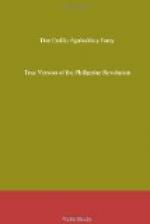The facts as stated are of recent date and must still be fresh in the memory of all.
Those who in May, 1898, admired the courage of Admiral Dewey’s sailors and the humanitarianism of this illustrious Commander in granting visible aid to an oppressed people to obtain freedom and independence, surely cannot place an honest construction upon the present inhuman war when contrasting it with those lofty and worthy sentiments.
I need not dwell on the cruelty which, from the time of the commencement of hostilities, has characterized General Otis’s treatment of the Filipinos, shooting in secret many who declined to sign a petition asking for autonomy. I need not recapitulate the ruffianly abuses which the American soldiers committed on innocent and defenseless people in Manila, shooting women and children simply because they were leaning out of windows; entering houses at midnight without the occupants’ permission—forcing open trunks and wardrobes and stealing money, jewellery and all valuables they came across; breaking chairs, tables and mirrors which they could not carry away with them, because, anyhow, they are consequences of the war, though improper in the case of civilized forces. But what I would not leave unmentioned is the inhuman conduct of that General in his dealings with the Filipino Army, when, to arrange a treaty of peace with the Civil Commission, of which Mr. Schurman was President, I thrice sent emissaries asking for a cessation of hostilities.
General Otis refused the envoys’ fair and reasonable request, replying that he would not stop hostilities so long as the Philippine Army declined to lay down their arms.
But why does not this Army deserve some consideration at the hands of General Otis and the American forces? Had they already forgotten the important service the Filipino Army rendered to the Americans in the late war with Spain?
Had General Otis forgotten the favours conferred on him by the Filipino Army, giving up to him and his Army the suburbs and blockhouses which at such great sacrifice to themselves the Filipinos had occupied?
Why should General Otis make such a humiliating condition a prime factor or basis of terms of peace with an Army which stood shoulder to shoulder with the American forces, freely shedding its blood, and whose heroism and courage were extolled by Admiral Dewey and other Americans?
This unexplained conduct of General Otis, so manifestly contrary to the canons of international law and military honour, is eloquent testimony of his deliberate intention to neutralize the effects of Mr. Schurman’s pacific mission.
What peace can be concerted by the roaring of cannon and the whizzing of bullets?
What is and has been the course of procedure of General Brooke in Cuba? Are not the Cubans still armed, notwithstanding negotiations for the pacification and future government of that Island are still going on?




